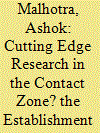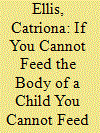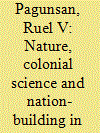| Srl | Item |
| 1 |
ID:
178160


|
|
|
|
|
| Summary/Abstract |
By 1928, Robert McCarrison’s laboratories in the South Indian hill station of Coonoor had become recognised as the centre for nutritional research in India. Five years earlier, however, his institute had faced closure. This article argues that the establishment of McCarrison’s institute was based on his pitch to the Royal Commission on Agriculture in India in 1926, in which he successfully aligned his research to satisfy the concerns of various members of the Commission. This discussion uses McCarrison’s lobbying for his institute as a case study to examine the broader political manoeuvrings that colonial scientists in the early twentieth century often had to undertake to establish their research agendas.
|
|
|
|
|
|
|
|
|
|
|
|
|
|
|
|
| 2 |
ID:
098508


|
|
|
|
|
| Publication |
2010.
|
| Summary/Abstract |
Africanists have long criticized the social construction, and consequences, of technical knowledge. Colonial science was seen as a particularly problematic enterprise, moulded by authoritarian colonial states, wherein science 'delineated the relationship of power and authority between rulers and ruled'. Much the same critique has been applied to post-colonial experts and expertise, becoming almost paradigmatic in the literature. This article seeks to re-open this debate, pointing to the diverse and changing location of scientists; the salience of scientific work in constructing categories and understandings for historians and social scientists; the value of trying to understand scientific explanations, as opposed simply to analyse their application in coercive policies; and the degree to which experts have sometimes incorporated local knowledge. The article draws examples from veterinary science and policy in southern Africa, and seeks to move beyond the inversions of colonial thinking in post-colonial analysis and provide instead a platform for interdisciplinary research strategies.
|
|
|
|
|
|
|
|
|
|
|
|
|
|
|
|
| 3 |
ID:
178161


|
|
|
|
|
| Summary/Abstract |
In 1925 the Madras Municipal Corporation introduced an innovative scheme to provide free midday meals for poor schoolchildren in the city. These meals were designed to both improve the physical health of the schoolchildren and contribute to their educational attainments. This paper examines the advice of nutritional experts at the Coonoor Centre for Nutritional Research and the new scientific emphasis on diet and malnutrition in South India. It then considers the debates among the corporation’s elected councillors regarding the particular nutritional needs of the Indian schoolchild. These negotiations contributed to wider debates about nutrition and colonial science and reflected changing discourses surrounding the relationship between the state, experts and parents. Although the scheme was limited in funds and in scale, I suggest that the political commitment to feeding hungry children was a significant departure in the history of children and the Indian welfare state.
|
|
|
|
|
|
|
|
|
|
|
|
|
|
|
|
| 4 |
ID:
177929


|
|
|
|
|
| Summary/Abstract |
This article examines colonial nature-making in twentieth century Philippines. It particularly looks into natural history investigations of the American-instituted Bureau of Science and the ways in which it created a discursive authority for understanding the Philippine natural environment. These biological investigations, the article argues, did not only structure the imperial construction of the colony's nature, but also provided a blueprint for imagining notions of national integration and identity. The article interrogates the link between colonial scientific projects and nation-building initiatives, emphasising the scripting of the archipelago's nature and the creation of a national science through biological spaces.
|
|
|
|
|
|
|
|
|
|
|
|
|
|
|
|